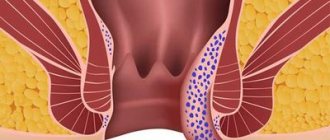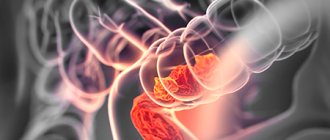Stages of hemorrhoids
There are 4 stages of hemorrhoidal disease:
- At the first stage, the symptoms of hemorrhoids, as a rule, are not so pronounced; they can occur periodically, for example, after hypothermia or after lifting heavy objects. Patients note discomfort and minor pain in the rectum, itching, a feeling of incomplete bowel movement, and occasionally the appearance of traces of blood on toilet paper after defecation. Hemorrhoids at this stage do not fall out and are located inside the rectum. It is at the first stage that this disease is easy to cure, but, unfortunately, patients rarely turn to a proctologist with such symptoms.
- At the next stage, these symptoms intensify. Hemorrhoids increase in size and feel like the presence of a foreign body in the rectum. Moreover, they may fall out during bowel movements. Bloody discharge becomes more abundant.
- The third stage is characterized by the fact that hemorrhoids fall out of the rectum with the slightest straining or straining and cannot be reduced on their own. Pain and bleeding become pronounced.
- At the fourth stage, the size of the hemorrhoids no longer interferes with the normal process of defecation, they constantly hurt and bleed.
Application
Relief candles must be purchased for use in accordance with the instructions contained in the instructions. The drug is an over-the-counter drug, but it should only be used to treat hemorrhoids if recommended by a doctor.
Before using relief candles, you must first carry out hygiene procedures. The recommended dosage is 1 suppository up to 4 times a day. If there are other medical indications, the frequency of use of the drug may be changed.
The optimal time of administration is morning administration. The use of suppositories after bowel movements is also considered effective. The average therapeutic course of treatment is 1-2 weeks. As a rule, with regular use of suppositories during this time, it is possible to achieve a stable therapeutic result and eliminate the unpleasant symptoms of the disease.
Hemorrhoids in men and women
There is no difference between the clinical manifestations of hemorrhoids in men and women. Differences may lie in the causes of the disease. Pregnancy and childbirth increase the risk of developing hemorrhoids in women. During pregnancy, the uterus increases in size, puts pressure on the pelvic veins, and the tone of the vein walls decreases, leading to blood stagnation. The vessels in the rectum begin to dilate and this leads to the formation of hemorrhoids.
During the birth itself, intra-abdominal pressure increases, as a result of which the veins of the rectum become filled with blood and swell, and hemorrhoids may fall out.
Therefore, before planning a pregnancy, women are recommended to undergo a proctological examination in order to exclude or identify hemorrhoids at the initial stage and undergo a course of treatment. This will allow you to avoid unpleasant manifestations of the disease during such a wonderful period of life for any woman.
Men have their own risk factors for developing hemorrhoids. Men are more likely than women to engage in strength sports, and their work more often involves lifting weights. Loads significantly increase intra-abdominal pressure, and if the walls of the vessels of the rectal veins are weak, hemorrhoids may develop. Also, drinking strong alcoholic drinks provokes the development of hemorrhoidal disease.
If we talk about the differences between hemorrhoids in men and women, we can note that men are less likely to visit a proctologist in the initial stages and see a doctor when the disease is already advanced. This may be due to embarrassment, or because the man does not want to change his lifestyle, profession, or hobbies.
How to prepare for hemorrhoid surgery
Preoperative examination includes an examination by a doctor and a number of laboratory and instrumental examinations, among which the following are mandatory:
- blood and urine tests (general);
- biochemical blood test;
- coagulogram;
- determination of blood group and Rh factor;
- blood test for antibodies to HIV and hepatitis viruses.
A few days before the planned date of surgery, the patient should adhere to a special diet with a minimum of foods that stimulate peristalsis. On the eve of the operation and 2-3 hours before it, you should do a cleansing enema. You should definitely tell your doctor if you are taking any medications; you should evaluate the possibility of taking them during and after surgery.
Is it necessary to treat stage 1 hemorrhoids?
To treat or not to treat hemorrhoids at stage 1 depends on the symptoms. If there is severe discomfort, itching, and blood appears during bowel movements, then it is necessary to treat. As a rule, treatment begins with the regulation of nutrition. To avoid constipation, you need to follow a diet: eat more fiber (fruits, vegetables, legumes, cereals) and maintain water balance; it is recommended to drink at least 2 liters of clean water per day. Next, conservative treatment of hemorrhoids may be prescribed - topical medications, physiotherapy. If conservative treatment has no effect, minimally invasive non-surgical methods are used.
If you were diagnosed with stage 1 hemorrhoids during a routine examination, or the symptoms are so minor that they do not cause discomfort, there is no bleeding, and you feel well, then there is no need for treatment. After all, as we wrote above, the treatment of stage 1 hemorrhoids is symptomatic. It is necessary to adjust the diet so as not to provoke constipation, and maintain physical activity.
The main problem is that, having discovered such symptoms as blood, pain, discomfort in the rectum, people themselves diagnose themselves with hemorrhoids and begin to self-medicate. This is absolutely not worth doing! Besides hemorrhoids, there are many other diseases with similar symptoms. Because of the fear of visiting a proctologist, you can even reach the fourth stage of hemorrhoids, not to mention more serious diseases. Only a doctor at an appointment can make a correct diagnosis. Believe me, in fact, a proctological examination in modern clinics is absolutely not a problem that you need to worry about. In medical diagnostics, diagnostics are carried out absolutely painlessly, using local anesthesia, in the most comfortable conditions for the patient. As for the treatment itself, several painless procedures may be required.
Take care of yourself, do not advance the disease, because treating hemorrhoids in the early stages is always easier and faster.
We care about your health
Hemorrhoids: stop hiding the problem!
People don't want to talk about hemorrhoids - it's a private topic. Having discovered hemorrhoids, patients are ashamed to see a doctor, preferring to patiently endure the torment. And often they don’t even know where to turn. The disease greatly complicates everyday life - constant pain, bleeding, itching and burning in the anal area. Attempts at self-medication with various ointments and suppositories do not lead to recovery, but only bring relief for a short time. Then it all starts again. But modern proctology allows you to cure hemorrhoids very quickly, without pain and forever. Surgeon-proctologist Alexey Gennadievich Pak talks about what hemorrhoids are and why you shouldn’t be embarrassed about seeing a doctor.
Alexey Gennadievich, what are hemorrhoids?
Hemorrhoids are a disease associated with the human venous system, which is characterized by the expansion of vascular formations (corpora cavernosa), which are located in the anal canal.
Cavernous bodies are present in the body of every person, but, under the influence of certain reasons, in some people these bodies expand, which, in fact, is the disease hemorrhoids. More than 10,000 operations were performed, including 3,500 for disarterization.
What are the causes of hemorrhoids?
There are quite a lot of them, but the main reasons are a passive, that is, sedentary, lifestyle, too much physical activity and some bad habits, such as alcohol and smoking. Each of the listed factors separately does not cause hemorrhoids - this disease, as a rule, is the result of a complex of several completely different factors.
How can a person determine that he has hemorrhoids?
In the evenings, the patient experiences anal itching, he begins to notice traces of blood after defecation, discomfort and a feeling of a foreign body in the anal area arise, mainly after stool. These are the first symptoms that let a person understand that he has some problems and needs to see a doctor. Subsequently, if the patient does not consult a specialist, he begins to develop the second, third and fourth stages of hemorrhoids, when (depending on the stage of the disease) protrusion or prolapse of the enlarged cavernous bodies from the anal canal occurs.
Why should hemorrhoids be treated by a doctor? Can’t it go away on its own or as a result of self-medication?
No, you cannot treat yourself, because a disease such as hemorrhoids will not go away on its own. Some complications that occur with hemorrhoids can be treated with conservative methods - ointments, suppositories - but there are a lot of such drugs and only a doctor can choose the right and effective one for a particular complication. Unfortunately, very often people simply turn to a pharmacist from the nearest pharmacy, who, due to his competence, cannot make a correct diagnosis, or simply buy a medicine advertised on TV. Correct conservative therapy for complications or exacerbations of the disease can only be prescribed by the attending physician.
If hemorrhoids are not treated, what complications can occur?
Serious complications may arise, such as anemia of the body (decreased hemoglobin in the blood) - it becomes difficult for a person to walk, shortness of breath, and increased heart rate. Thrombosis (blockage) of hemorrhoids may begin, which causes severe pain in the anal canal area.
Which doctor treats hemorrhoids?
Hemorrhoids are treated by a proctologist who conducts therapeutic consultations and, if necessary, performs surgical operations of varying complexity and treats complications that arise.
What treatment methods are there?
In modern proctology, there are many different methods for treating hemorrhoids; they can be divided into three groups: conservative, surgical-minimally invasive and surgical methods. Conservative therapy is used to treat various exacerbations that occur with hemorrhoids, and if the disease is not cured, it gives the patient only temporary relief.
Minimally invasive methods involve the least traumatic effect on tissue and a fairly short recovery period. In the final stages of the disease, when it is no longer possible to use minimally invasive methods, Milligan-Morgan surgery or Longo surgery are used. But today, the most modern method of surgical treatment of hemorrhoids is laser vaporization - evaporation of cavernous tissues and internal hemorrhoids using small punctures. This technique is effective and shortens the rehabilitation period.
Is it possible to cure hemorrhoids completely?
Yes, hemorrhoids can be cured once and for all, one hundred percent! The main thing is not to be afraid, get rid of false embarrassment and go to an experienced proctologist.
Diagnostics
A timely visit to a proctologist will help in making a diagnosis. During the consultation, the medical specialist will talk with the patient, perform an external and internal examination of the anal canal, and palpate the internal nodes.
The patient will be asked to take stool tests (for occult blood, worm eggs, Giardia) and blood tests (for hemoglobin levels, coagulability, and leukocytes).
A more detailed examination is carried out using an anoscope and sigmoidoscopy. In the first case, the anal canal is examined to a depth of up to 10 cm, in the second - up to 25 cm.
Minimally invasive therapy
If the effect of conservative methods is insignificant, treatment of internal hemorrhoids is carried out using innovative technologies. If the effect of conservative methods is insignificant, internal hemorrhoids are treated using innovative technologies.
Minimally invasive treatment methods include:
- Sclerotherapy (gluing the walls of inflamed hemorrhoidal veins).
- Infrared photocoagulation (using a coagulator, a targeted and short-term effect on different parts of the node).
- Latex ligation (alternate clamping of nodes with latex rings).
- Laser technologies.
The use of such therapeutic measures guarantees low blood loss, painlessness, rapid recovery, and the absence of relapses and complications.
Duration of treatment
So, how long does it take for hemorrhoids to go away after conservative or surgical treatment? It depends on the stage, form of the disease, and the chosen treatment method:
- Drug treatment takes an average of 2-4 weeks;
- after minimally invasive correction methods, the patient recovers at home for up to 3 weeks;
- After surgery, the patient is recommended to stay in the hospital for 12 days, after which he needs to recover at home for 3 weeks.
At this stage of medical development, complete recovery of the patient is impossible. However, the sooner he consults a coloproctologist, the greater the chance of correcting his health condition using low-traumatic methods.
The Femina clinic employs experienced proctologists and has modern diagnostic and treatment equipment. Make an appointment by phone or online.
Causes
There is a whole set of factors that lead to hemorrhoids:
- Insufficiently active lifestyle. Physical inactivity in the modern world can be explained by spending a long time in front of TV and the computer, and constantly driving a car. This negatively affects the blood circulation in the pelvic area and anus, which can lead to pathological processes in the hemorrhoidal veins.
- Wrong diet. The predominance of fatty, smoked, salty and spicy foods, fast food snacks provoke constipation and the formation of internal hemorrhoids.
- Alcohol abuse. Alcohol-containing drinks dilate the vessels of the anal canal and rectum, thereby preparing the ground for the disease.
- Excessive physical activity and heavy lifting can lead to the development of pathological changes in the hemorrhoidal veins.
- Difficult birth.
Treatment after hemorrhoid surgery
The following pathological conditions are indications for radical surgery:
- Prolapse of the mucous membrane with strangulation of hemorrhoids.
- Thrombosis of hemorrhoids.
- Bleeding from hemorrhoids.
Such complications are an indication for emergency surgery. The main treatment method for complicated hemorrhoids is hemorrhoidectomy. Before the operation, an antibiotic is administered and anesthesia is performed. After removal of hemorrhoids, the patient should not eat for 24 hours, and fluid intake is limited. The doctor gives recommendations on a diet that should be strictly followed.
The diet should contain foods rich in fiber and plenty of liquid. This diet helps with rapid healing of wounds and rapid recovery after surgery. After the operation, the doctor prescribes painkillers to relieve pain; antibiotics, anti-inflammatory rectal suppositories, and ointments are prescribed to relieve the inflammatory process. In the early postoperative period, nitroglycerin cream (0.2%) is used, which relieves spasms of the rectum and sphincter. After surgery, to prevent the development of relapse, the patient should fight constipation with the help of a balanced diet, therapeutic exercises, and medications.
On average, the postoperative uncomplicated recovery period takes about two months. In many ways, quick rehabilitation after surgery depends on the patient and his compliance with all the recommendations of the proctologist.
How to prevent relapse
Laser surgery reduces the risk of recurrence of hemorrhoids to a minimum. But for a complete recovery you will have to change your lifestyle. It is important to establish regular bowel movements. A diet rich in dietary fiber and movement will help with this. Physical exercise will also help strengthen the venous walls.
Avoid heavy lifting if possible. If you have to sit a lot at work, take breaks every half hour: walk, do simple exercises. Another important aspect is personal hygiene. Choose soft, preferably damp toilet paper; if possible, wash with cool water. Switch to loose underwear made from natural fabrics.
The Clinic of Dr. Grishin employs professional proctologist surgeons. Our patients have access to all types of modern hemorrhoid removal. The clinic is equipped with a laser machine. The operation will take no more than half an hour, and you will go home. The postoperative period will pass quickly, with a minimum of inconvenience, and you will not fall out of your usual rhythm of life.
The big picture
Internal hemorrhoids, like external hemorrhoids, significantly reduce a person’s quality of life. Prolonged sitting or standing, defecation - all this is often accompanied by painful sensations. Itching, irritation, prolapse of hemorrhoids, and bleeding indicate pathology in human health.
How to remove hemorrhoids yourself is a topic that worries many people. All attempts to get rid of the problem without the help of a doctor may not solve it, but only worsen the negative aspects. The disease progresses and can cause cancer and other serious diseases.
Conservative treatment
How to remove hemorrhoids located on the internal hemorrhoidal veins? Modern proctology has a whole arsenal of effective techniques to combat this problem.
In the early stages of the disease, drug treatment can be tried.
Suppositories and ointments provide an analgesic effect. It is better to give preference to candles, they do not spread and have a targeted effect on the hemorrhoidal node.
The proctologist will give recommendations on which specific medications to use for a particular patient. An individual approach to the treatment of internal hemorrhoids takes into account the degree of disease, the location of the nodes and the general health of the patient.
To prevent the occurrence of new hemorrhoids, the coloproctologist will prescribe medications for the tonic effect of the veins.








